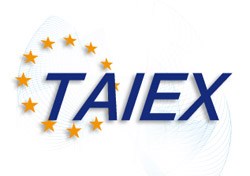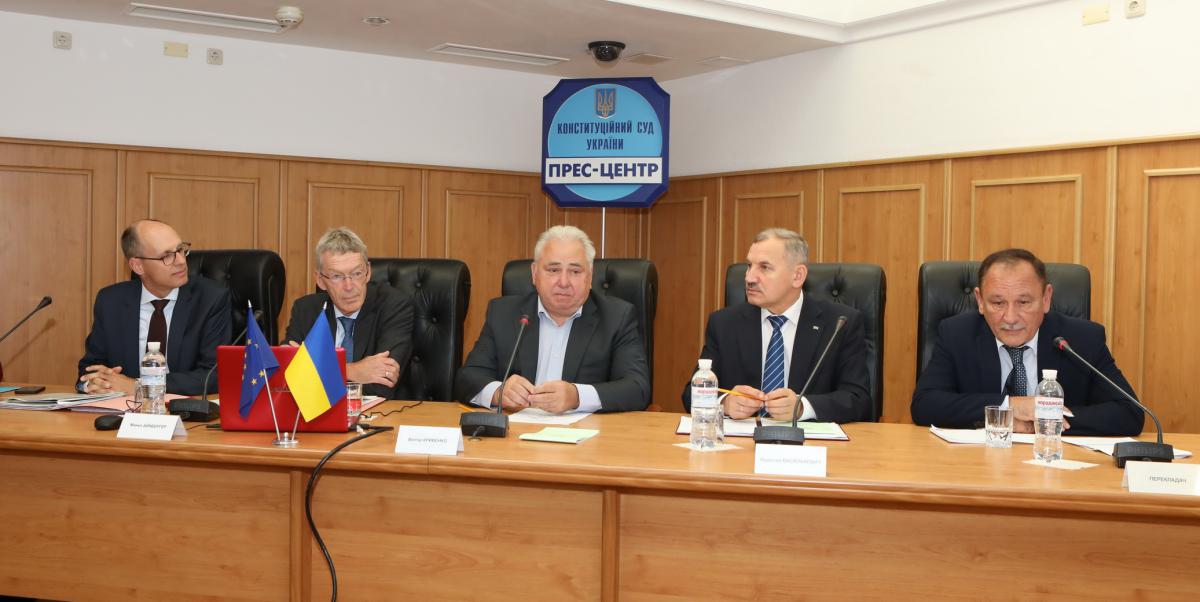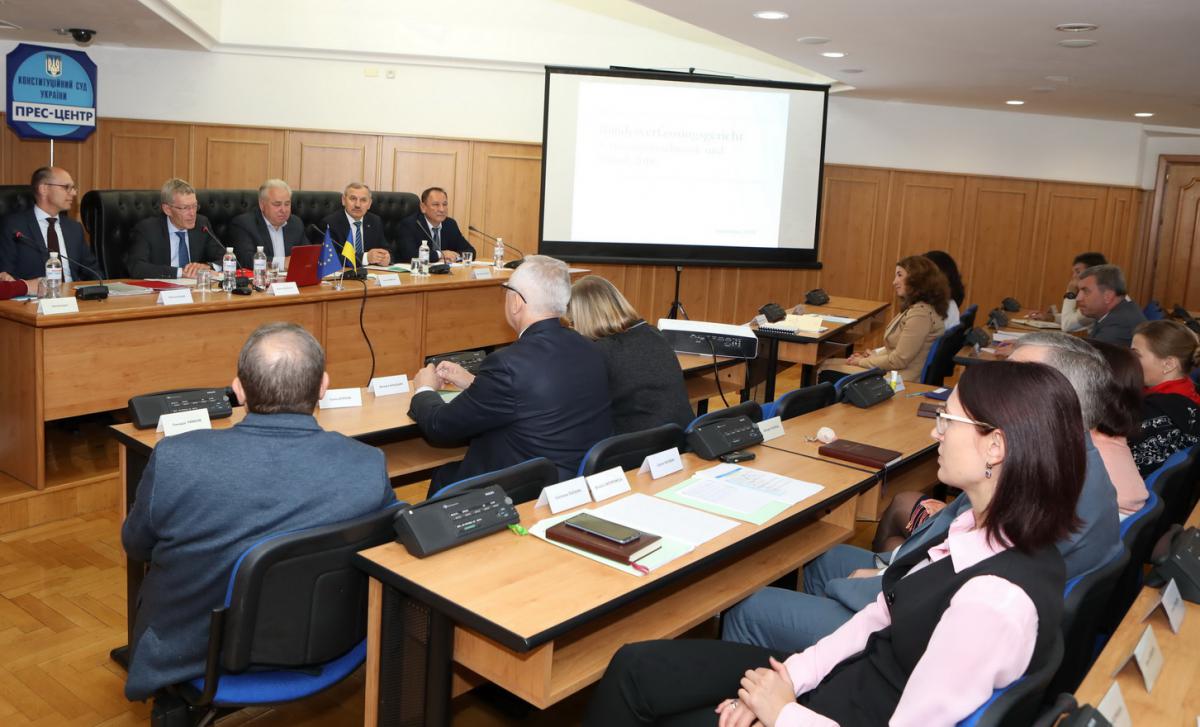TAIEX Expert Mission on Improving Efficiency and Effectiveness of the Secretariat of the Constitutional Court of Ukraine took place at the Constitutional Court of Ukraine
 On September 23-26, 2019 the TAIEX Expert Mission on Improving Efficiency and Effectiveness of the Secretariat of the Constitutional Court of Ukraine took place at the Constitutional Court of Ukraine.
On September 23-26, 2019 the TAIEX Expert Mission on Improving Efficiency and Effectiveness of the Secretariat of the Constitutional Court of Ukraine took place at the Constitutional Court of Ukraine.
The Chairman of the Constitutional Court of Ukraine Oleksandr Tupytskyi, the judges of the Constitutional Court of Ukraine, the Head of the Secretariat of the Constitutional Court of Ukraine Yaroslav Vasylkevych, the First Deputy Head of the Secretariat of the Court Larysa Biriuk, the deputy heads of the Secretariat of the Court Valerii Aloshyn, Yevhen Burlai as well as the heads of structural units of the Secretariat of the Court attended the event. Professor, Doctor, Former Judge of the Federal Constitutional Court of Germany Michael Eichberger and the Head of the Judicial Administration of the Federal Constitutional Court of Germany Volker Batzke were the experts of TAIEX Expert Mission.
The purpose of the four-day event was to exchange experience in dealing with constitutional complaints at the judicial and administrative levels, to have active discussions with experts, to receive proposals for changes and improvements, as well as to study the procedures and organisational arrangements at the judicial administration of the Federal Constitutional Court of Germany for handling a large number of constitutional complaints.
Welcoming the participants of the meeting, Oleksandr Tupytskyi noted the longstanding fruitful cooperation between the Constitutional Court of Ukraine and the European Commission within the framework of TAIEX events and expressed his hope for its further development. “Since 2009, both judges of the Constitutional Court of Ukraine and employees of the Secretariat of the Court have participated in various activities to develop the institutional capacity needed to harmonise domestic legislation with the acquis communautaire”, he emphasised.
According to the Chairman of the Constitutional Court, the event was an important opportunity to exchange experience on current issues, to develop proposals to improve the consideration of a large number of constitutional complaints, and to discuss the issues of organising internal work of the structural units of the Secretariat of the Constitutional Court of Ukraine and the possibilities for its improvement.
Finally, Oleksandr Tupytskyi wished the participants fruitful work and constructive dialogue.
Within the framework of the program, Yaroslav Vasylkevych informed the guests about the powers of the body of the constitutional jurisdiction of Ukraine, presented the organisational structure of the Court and provided for a general description of its Secretariat.
 He focused his attention on the peculiarities of constitutional proceedings in cases upon constitutional petitions, appeals and complaints.
He focused his attention on the peculiarities of constitutional proceedings in cases upon constitutional petitions, appeals and complaints.
During the first day of the mission, the management of the Secretariat of the Court briefed the experts on the organisation of the internal work of the departments of the Secretariat of the Court, their interaction with other structural units and the overall distribution of functional load in the Secretariat of the Constitutional Court of Ukraine.
The experts had an opportunity to visit the session rooms of the Grand Chamber and the Senate, the Library, the Archives, the museum exhibition of the Court.
During the second day of the TAIEX Expert Mission, a number of issues were discussed concerning the principles of the judicial corps and the judicial administration of the Federal Constitutional Court of Germany, the decision-making processes upon constitutional complaints at the level of judges, and the application of certain measures to handle a large number of complaints pending the Court.
Acting Chairman of the Constitutional Court of Ukraine Victor Kryvenko stressed on the long friendly cooperation with German colleagues on exchange of experience on constitutional justice and noted that such meetings are taking place both in Ukraine and abroad, and have already become a good tradition. “In comparison with the German constitutional judiciary, the Ukrainian constitutional judiciary is still young, so the experience of German colleagues will be useful for us,” Viktor Kryvenko pointed out. He also noted that the scientific advisers of judges and the staff of the Secretariat were able to familiarise with the organisation of work of the Registry of the Federal Constitutional Court of Germany and noted the important role of the office of the Judge of the Constitutional Court of Ukraine, especially in preparation of constitutional complaints for consideration.
Professor, Doctor, Former Judge of the Federal Constitutional Court of Germany Michael Eichberger stressed the importance of joint activities that facilitate the exchange of experience and provide an opportunity to be acquainted with the methods and organisation of the courts in order to optimise their work.
 The expert spoke in detail about the composition and powers of the Federal Constitutional Court of Germany, the subjects of constitutional complaint, the acts that can be challenged, the stages of constitutional proceedings, and also elaborated on the principles of cooperation between the judicial corps and the judicial administration of the FCC of Germany and the measures taken in order to relieve the judges of the large number of constitutional complaints received by the Court.
The expert spoke in detail about the composition and powers of the Federal Constitutional Court of Germany, the subjects of constitutional complaint, the acts that can be challenged, the stages of constitutional proceedings, and also elaborated on the principles of cooperation between the judicial corps and the judicial administration of the FCC of Germany and the measures taken in order to relieve the judges of the large number of constitutional complaints received by the Court.
Michael Eichberger emphasised that individuals and legal entities may lodge the constitutional complaints with the Federal Constitutional Court of Germany if their constitutional rights are violated. The German law entitles these persons to challenge acts of the legislature, the executive power, and the judiciary.
The speaker cited statistics on the number of applications to the Constitutional Court of Germany, noting that five-six thousand constitutional complaints are submitted to the Court each year.
The expert described the procedure for considering constitutional complaints before the Court, noting the importance and extent of the justification for such a complaint to be accepted by the Court.
Volker Batzke, the Head of the Judicial Administration of the Federal Constitutional Court of Germany, spoke about the procedure and organisational measures of judicial administration of the Federal Constitutional Court of Germany.
The speaker focused his attention on the structure of the Judicial Administration of the Court, the peculiarities of the processing of incoming correspondence. He also referred to the functioning of the general register of documents before the Court, as well as the register of court proceedings. Referring to the statistics of the general register of documents, the speaker has noted that last year more than nine thousand incoming correspondence (letters, complaints, applications, etc.) were received by the FCC of Germany.
The key topics of the third day of the TAIEX expert mission's work were the topical issues of the Court's communication with the public and the methodology for determining the priority areas of communication with the public. In their speeches, the experts described the mechanisms for the court's interaction with members of the media and the public, in particular from the point of view of the judge and the representative of the judicial administration.
According to them, communication with the media and society is important for the German Constitutional Court. “The authority of the institution is important because, if citizens are treated with respect, it will facilitate the enforcement of its decisions,” said Michael Eichberger.
 According to experts, only a court that has secured the support of the general public can effectively administer justice. The authority and respect for the court is achieved by the effective implementation of the judiciary, the independence of judges and the justification of the decisions.
According to experts, only a court that has secured the support of the general public can effectively administer justice. The authority and respect for the court is achieved by the effective implementation of the judiciary, the independence of judges and the justification of the decisions.
In their speeches, they outlined in detail the forms and mechanisms of cooperation between the Federal Constitutional Court and the public. The experts noted that the Court's activities could be informed through the preparation of press releases on the outcome of cases, judges could also directly explain their decisions during public meetings, and participate in scientific events, in particular, occurring both at national and international levels.
During the work of the TAIEX Expert Mission, a number of topical issues related to the peculiarities of the activity of the body of constitutional jurisdiction were discussed. In particular, the decision-making processes at the level of judges regarding constitutional complaints filed with the Federal Constitutional Court of Germany with particular emphasis on the possibility of handling a large number of cases, procedures and organisational measures of judicial administration of the Federal Constitutional Court of Germany for consideration of a large number of constitutional complaints. The participants also exchanged views on communication with the public and the methodology for determining priority areas of communication with the public.
Summarising the results of the four-day event, the participants noted the importance of such meetings for the exchange of experience and expressed their hope for further fruitful cooperation.

